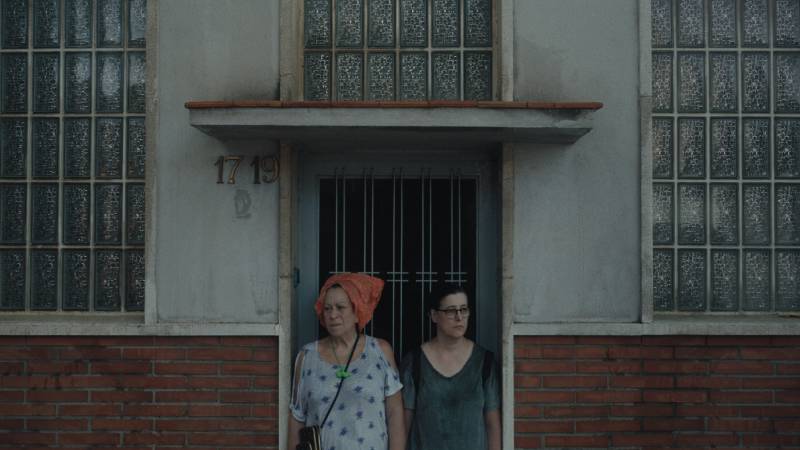Anatoly (Oleksandr Maksiakov) is a middle-aged male about to enter the winter of his life. His mother Maria (Nina Antonova) is in the very late winter of her life. He travels to the Ukrainian countryside in order to care for her. His brother Alexey (Oleg Primogenov) is nearby, but it is Tolya who devotes the most time to the increasingly frail woman who barely recognises her own children. Shortly before she passes away, she shares the secret of a secret treasure hidden inside the shed. Was that an old-age delusion, or is there a valuable asset to be unearthed? “Tolya” (Anatoly’s nickname) is keen to find out. Meanwhile, he also reconnects with his long-lost, youth love Ania (Radmila Shegoleva).
This godforsaken village is the image of yesterday. The locals live in shabby houses with asbestos rooftops, and walls that have not seen a lick of paint since the day Stalin died. There is not a young person at sight. The headscarf-clad, wrinkly old ladies and their sullen, octogenarian husbands look like characters from a Soviet movie. USSR memorabilia and mementos are conspicuous, including a drawing of Lenin and a half poster of Stalin erected on a wooden structure (the fat moustache giving away his identity). This community is so precarious and deeply buried in the past that you would never guess that the story takes place in present-day Ukraine was it not for the brief appearance of a mobile phone. The remoteness of the area caters for the lack of mobile reception, reaffirming the sense of otherworldliness and detachment from the rest of Europe that prevails throughout the movie. There is no mention of the Ukrainian War (and that’s ok: it’s not mandatory that every single Ukrainian movie should directly address the Russian invasion).
The weather is wintry and inhospitable, adding the perfect finishing touch of melancholia to this twilight drama. The sense of isolation is highlighted by a bumpy bus ride, in the film’s opening sequence. The camera – presumably a subjective take from Antatoly’s point-of-view – reveals a long and windy dirt road covered in snow. The vast landscape too is covered in white, in contrast to the grey houses and the dark attire of the few and far between villagers. The cinematography is moody and gloomy, the colours mostly opaque. This is a movie that could have been made in black-and-white (as are the visual memories that audiences will take home with them).
Is a quiet dog that observes the mourning an augury of tragedy? The animal neatly embodies the overpowering sense of mourning that intoxicates the movie. His fate in unclear. Could he be devoured by the wolves, or simply die of starvation if left behind? The answer to this question has a profound resonance, bringing closure to this story of loss, grief, and coming to terms with the circle of life.
Stepne deserves credit for its realistic portrayal of a little-known face of Ukraine, and for the convincing performances (both Maksiakov and the elderly actors are honest and candid). At times, the movie feels like an observational, almost sensory documentary, a fly-on-the-wall type of register. Ukrainian director Maryna Vroda, however, had bigger intentions. She explains that Stepne reflects upon “the silence of past generations about their history”. It takes an eye extremely familiar with Soviet history in order to grasp the inferred topics. While I recognise that the characters are mostly silent (the conversations are sparse and laconic), I have absolutely no idea what is it that these people are refusing to discuss, and which taboos the movie is attempting to address. A woman’s choice to speak in her native Russian tongue is briefly challenged, presumably a comment on language as a geopolitical weapon. But that’s about it.
The biggest problem with Stepne is that it fails to enrapture viewers. It possesses neither the storytelling panace nor the visual splendour required in order to keep viewers hooked for nearly two hours. Instead, it becomes monotonous roughly 30 minutes from the beginning. This is not Alexander Sokurov’s Mother and Son (1997). Maryna Vroda’s debut lacks the vigour and the aesthetic supremacy of its Russian counterpart, also a movie about an ageing son caring for his dying mother.
Stepne just premiered in the Official Competition of the 76th Locarno Film Festival. Maryna Vroda won the Palme d’Or in 2011 for her short Cross Country. The film shows at the Best of Festivals section of the 27th Tallinn Black Nights Film Festival:











